 Global| Dec 21 2007
Global| Dec 21 2007U.S. Personal Consumption & Prices Firm, Income Light
by:Tom Moeller
|in:Economy in Brief
Summary
Personal consumption expenditures surged 1.1% last month after an upwardly revised 0.4% rise. The November increase beat Consensus expectations for a 0.7% rise. Adjusted for inflation spending rose 0.5% after the upwardly revised 0.1% [...]
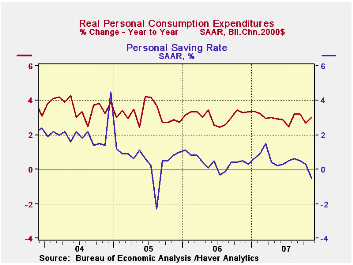
Personal consumption expenditures surged 1.1% last month after an upwardly revised 0.4% rise. The November increase beat Consensus expectations for a 0.7% rise. Adjusted for inflation spending rose 0.5% after the upwardly revised 0.1% uptick. Three month growth in real spending rose to 3.4% (AR).
Spending on discretionary items was firm led by a 1.8% (9.6% y/y) jump in real spending on household furniture & appliances. Spending on apparel also rose a firm 0.9% (5.6% y/y) but spending on motor vehicles fell 0.8% (+2.4% y/y). Spending on electricity surged 5.9% (6.9% y/y) but real spending on gasoline fell 0.3% (-0.6% y/y). Medical care spending rose 0.2% and spending on recreation fell 0.1%). Spending on food rose 0.7% (2.2% y/y). Real spending excluding food & energy rose 0.4% (3.2% y/y). These detailed spending figures are available in Haver's USNA database.
The PCE chain price index surged 0.6%%,
lifted by higher energy prices. The core PCE price index gained a
steady 0.2% but y/y growth in core prices picked up further
to 2.2%. Three month growth in core prices rose to 2.9% (AR) due to
faster growth in services prices where the three month growth of 4.0%
was the fastest since late 2005.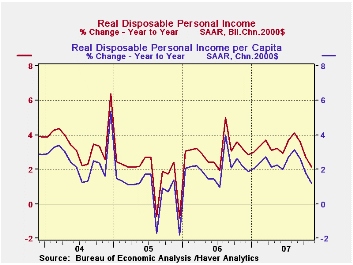
Personal income during November rose 0.4% and the gain fell just short of expectations for a 0.5% rise. The October increase was unrevised at 0.2%. Three month growth in income was 4.2% (AR), its worst since June.
Lower interest rates caused a shortfall in interest income of 0.4% (+6.2% y/y) which was the same decline as in October. Conversely, growth in dividend income held steady at 0.9% (12.6% y/y), the same as during the prior two months.
Growth in wages & salaries picked back up to 0.6% (5.2% y/y) after an unchanged reading for October. Three month growth amounted to 5.3%. Factory sector wages rose 0.4% (2.2% y/y) after declining during the prior two months.Wage & salary income in the private service-producing industries rose 0.7% (6.1% y/y) after no change in October. Wages in the government sector again increased 0.4% (4.6% y/y).
Personal current taxes rose a firm 0.7% (8.1% y/y) and that left disposable personal income to rise 0.3% (5.8% y/y). Adjusted for inflation disposable personal income fell 0.3% (+2.1% y/y) for the second month of decline. That left the three month growth in real DPI negative at -0.9%, its worst since June.
| Disposition of Personal Income | November | October | Y/Y | 2006 | 2005 | 2004 |
|---|---|---|---|---|---|---|
| Personal Income | 0.4% | 0.3% | 6.1% | 6.6% | 5.9% | 6.2% |
| Personal Consumption | 1.1% | 0.4% | 6.7% | 5.9% | 6.2% | 6.4% |
| Saving Rate | -0.5% | 0.3% | 0.5% (Nov. 06) | 0.4% | 0.5% | 2.1% |
| PCE Chain Price Index | 0.6% | 0.3% | 3.6% | 2.8% | 2.9% | 2.6% |
| Less food & energy | 0.2% | 0.2% | 2.2% | 2.2% | 2.2% | 2.1% |
by Tom Moeller December 21, 2007
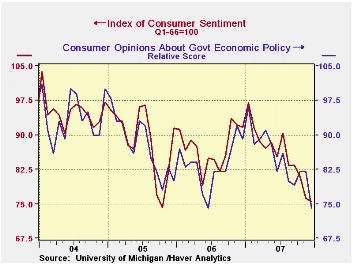
The University of Michigan's consumer sentiment index for all of this month fall 0.9% to 75.5.That was somewhat better than the reading at mid-month and it beat expectations for a December reading of 74.9. Nevertheless it left sentiment down 17.7% y/y.
Somewhat improved expectations caused the better December result. Expected business conditions during the next year fell only 6.8% (-35.2% y/y), an improvement from the -11.0% preliminary reading. Expectations for business conditions during the next five years also improved 6.6% (-16.5% y/y) from the November level and versus the initial read of a m/m decline. Down still is the result versus 3Q. Expectations for personal finances fell further by 2.6% (-9.7% y/y).
The current conditions index in fact was revised lower from
the mid-month reading and fell 0.5% after a hefty 6.3% November
decline. Current buying conditions for large household goods improved
modestly m/m but remained down 13.0% from last December. The view of
current personal finances, however, slid 3.0% for the second sharp
monthly decline (-17.6% y/y).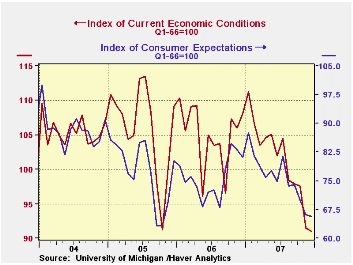
The rise in gasoline prices raised expectations for inflation during the next twelve months to 4.4% (slightly lower than the mid-month read) from 4.3% in November and from 3.5% one year ago. For the next five to ten years expectations were for a 3.6% rise in prices.
Opinions about government policy dropped 9.8% m/m which brought this opinion measure down 16.9% from one year ago.
The University of Michigan survey is not seasonally adjusted.The reading is based on telephone interviews with about 500 households at month-end; the mid-month results are based on about 300 interviews. The summary indexes are in Haver's USECON database, with details in the proprietary UMSCA database.
Consumer sentiment, the economy, and the news media is a 2004 paper from the Federal Reserve Bank of San Francisco and it can be found here.
| University of Michigan | Dec (Final) | Dec (Prelim) | Nov | Dec y/y | 2006 | 2005 | 2004 |
|---|---|---|---|---|---|---|---|
| Consumer Sentiment | 75.5 | 74.5 | 76.1 | -17.7% | 87.3 | 88.5 | 95.2 |
| Current Conditions | 91.0 | 92.1 | 91.5 | -15.8% | 105.1 | 105.9 | 105.6 |
| Expectations | 65.6 | 63.2 | 66.2 | -19.2% | 75.9 | 77.4 | 88.5 |
by Robert Brusca December 21, 2007
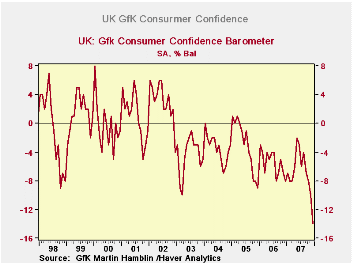
The GFK consumer sentiment report for the UK continues to
plunge and it is one of the clearest signs of trouble in the UK
economy. The CBI survey on retailing earlier had signaled some weakness
and expectations of a softer January to boot. But actual sales data
(released today) showed a gain in November although food accounted for
all the volume increase. While the Bank of England struggles with
policy, consumers seem to have made up their minds about where the
balance of risk lies.
At a reading of -14 the GFK index is at its weakest point in
over 10 Years. Still, households rate their financial situation as the
best in 10 years currently. In this environment their plans for making
major purchases are the lowest they have been in 10 Years. Consumers
rate the general economic situation in the past 12-months as the worst
in the past two years and in the bottom four percent over ten years.
They assess inflation as the worst in 10 years.
While BOE is concerned about inflation too, a recent wage
survey finds that wages deals have been contained in their recent range
and in fact are not accelerating. Of course while that may be good news
to the BOE, it is another factor pressuring consumers as energy prices
rise.
The outlook for the next 12-months score very weak readings
for the household financial situation and the general economic
situation both in the bottom 15 percentile of their respective ranges
for two years and about the bottom quarter of the range over 10-years.
The major purchases index is at the 50% mark for the next 12 months
compared to the past two years’ range, but that is a bottom 25% reading
over the past 10 years. Obviously the consumer sector has been weak and
is weakening again. Stratified by income, both high and low income
respondents see conditions as among their poorest in 10 years.
| GFK Consumer Survey | ||||||
|---|---|---|---|---|---|---|
| % of 2Yr | % of 10Yr | |||||
| Dec-07 | Nov-07 | Oct-07 | Sep-07 | Range | Range | |
| Consumer Confidence | -14 | -10 | -8 | -7 | 0.0% | 0.0% |
| Current | ||||||
| Household Financial Situation | 25 | 25 | 25 | 25 | 100.0% | 100.0% |
| Major Purchases | -14 | -7 | -5 | -3 | 0.0% | 0.0% |
| Last 12 Months | ||||||
| Household Financial Situation | -1 | 0 | 2 | 4 | 37.5% | 40.0% |
| General Economic Situation | -36 | -32 | -30 | -29 | 0.0% | 4.2% |
| CPI | 74 | 73 | 69 | 64 | 100.0% | 100.0% |
| Savings | 33 | 35 | 38 | 38 | 52.6% | 84.5% |
| Next 12-Months | ||||||
| Household Financial Situation | 8 | 9 | 13 | 12 | 14.3% | 14.3% |
| General Economic Situation | -26 | -21 | -17 | -19 | 0.0% | 26.7% |
| Unemployment | 30 | 31 | 29 | 27 | 35.7% | 62.5% |
| Major Purchases | -19 | -20 | -18 | -20 | 50.0% | 25.0% |
| Savings | 19 | 20 | 19 | 17 | 63.6% | 85.2% |
| By Income | ||||||
| Lower | -19 | -16 | -14 | -13 | 0.0% | 0.0% |
| Upper | -7 | -6 | -3 | -1 | 0.0% | 0.0% |
by Robert Brusca December 21, 2007
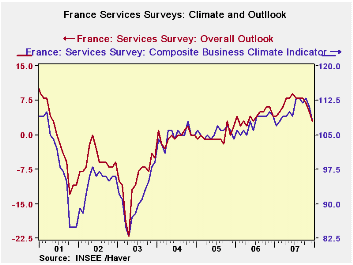
The service sector is beginning to ease in France. The index
is down form its peak if 113 in October. As a percent of its range the
December reading is still in the top 17% of its range. The outlook
reading at +3 stands in the 80.6 percentile of its range and is still
in the top 20% of that range. Expected sales for the 3-months ahead are
in the 67th percentile of their range, the top third, roughly.
Employment expectations are still firm in their range. Over the past
three months observed employment is nearly in the top quarter of its
range whereas expected employment in the three months ahead slips to
the top third at a reading of 10 which is in the 68th percentile of its
range.
These readings generally show that the outlook is a bit weaker
than the current or recent past readings have been. And while the
slowdown and drop off is clear on the chart it is also true that the
survey levels are still firm; what we must wait and see is how far this
expected softening may go.
Insee released today a separate survey on industry in which
morale fared much better than for services. It is surprising with the
concerns over the strong euro that it is the service sector where
morale is fading faster. This could have something to do with the
financial turmoil that has been in train, of course. But industry is
holding up much better despite its competitiveness pressures. Even in
that survey, however, there are more concerns among executives about
the outlook for production in their own business sector. French
consumer spending on MFG goods in also November worked its way lower
showing an unexpected drop. This spending results may have been
affected by recent transits strikes.
There is evidence of strain in the French economy. All of
these reports will bear watching as we turn the calendar sheet to a new
month and new a new year. We will come upon this new year with the
economy a bit more challenged than usual in France, across the Euro
Area, in the US and elsewhere.
| France INSEE Services Survey Jan 2000-date | ||||||||||
|---|---|---|---|---|---|---|---|---|---|---|
| Dec-07 | Nov-07 | Oct-07 | Sep-07 | %tile | Rank | Max | Min | Range | Mean | |
| Climate Indicator | 108 | 111 | 113 | 112 | 83.3 | 18 | 113 | 83 | 30 | 102 |
| Climate: 3-Mo Moving avg | 111 | 112 | 113 | 113 | 92.8 | 5 | 113 | 85 | 28 | 102 |
| Climate: 12-Mo Moving avg | 110 | 110 | 110 | 110 | 99.6 | 2 | 110 | 91 | 20 | 101 |
| Outlook | 3 | 5 | 7 | 8 | 80.6 | 23 | 9 | -22 | 31 | -1 |
| Sales | ||||||||||
| Observed 3-mos | 14 | 17 | 18 | 18 | 83.3 | 7 | 19 | -11 | 30 | 6 |
| Expected 3-mos | 9 | 13 | 14 | 14 | 67.9 | 38 | 18 | -10 | 28 | 7 |
| Sales Price | ||||||||||
| Observed over 3-Mos | 0 | -2 | 1 | 2 | 33.3 | 33 | 8 | -4 | 12 | 0 |
| Expected over 3-Mos | -2 | 2 | -1 | 1 | 30.0 | 69 | 5 | -5 | 10 | 1 |
| Employment | ||||||||||
| Observed over 3-Mos | 14 | 8 | 3 | 8 | 73.5 | 5 | 23 | -11 | 34 | 5 |
| Expected over 3-Mos | 10 | 11 | 17 | 9 | 68.2 | 13 | 17 | -5 | 22 | 5 |
Tom Moeller
AuthorMore in Author Profile »Prior to joining Haver Analytics in 2000, Mr. Moeller worked as the Economist at Chancellor Capital Management from 1985 to 1999. There, he developed comprehensive economic forecasts and interpreted economic data for equity and fixed income portfolio managers. Also at Chancellor, Mr. Moeller worked as an equity analyst and was responsible for researching and rating companies in the economically sensitive automobile and housing industries for investment in Chancellor’s equity portfolio. Prior to joining Chancellor, Mr. Moeller was an Economist at Citibank from 1979 to 1984. He also analyzed pricing behavior in the metals industry for the Council on Wage and Price Stability in Washington, D.C. In 1999, Mr. Moeller received the award for most accurate forecast from the Forecasters' Club of New York. From 1990 to 1992 he was President of the New York Association for Business Economists. Mr. Moeller earned an M.B.A. in Finance from Fordham University, where he graduated in 1987. He holds a Bachelor of Arts in Economics from George Washington University.
More Economy in Brief
 Global| Feb 05 2026
Global| Feb 05 2026Charts of the Week: Balanced Policy, Resilient Data and AI Narratives
by:Andrew Cates






